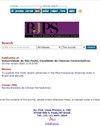Investigation on formulation parameters of donepezil HCl loaded solid lipid nanoparticles
IF 0.9
4区 医学
Q4 PHARMACOLOGY & PHARMACY
引用次数: 0
Abstract
symptomatic treatment of Alzheimer’s disease (AD) and has many side effects. In this study, to reduce the side effects of Donepezil-HCl and increase the penetration of the drug through the blood-brain barrier, we aimed to design a solid lipid nanoparticle (SLN) formulation. The effects of the different formulation parameters, such as homogenization speed, sonication time, lipid and drug concentration, surfactant type and concentration, and volume of the aqueous phase, were assessed for optimization. The particle size and PDI increased with increasing lipid concentration but decreased with increasing amounts of surfactant (Tween 80) and co-surfactant (lecithin). When the homogenization rate and sonication time increased, the particle size decreased and the encapsulation efficiency increased. The optimized formulation exhibited particle size, PDI, encapsulation efficiency, and zeta potential of 87.2±0.11 nm; 0.22±0.02; 93.84±0.01 %; -17.0±0.12 mV respectively. The in vitro release investigation revealed that approximately 70% of Donepezil-HCl was cumulatively released after 24 hours. TEM analysis proved that spherical and smooth particles were obtained and formulations had no toxic effect on cells. The final optimized formulation could be a candidate for Donepezil-HCl application in Alzheimer’s treatment with reduced side effects and doses for patients.盐酸多奈哌齐固体脂质纳米粒子的处方参数研究
它是阿尔茨海默病(AD)的对症治疗药物,但有许多副作用。在本研究中,为了减少多奈哌齐-盐酸的副作用,增加药物通过血脑屏障的渗透,我们旨在设计一种固体脂质纳米颗粒(SLN)配方。考察了匀浆速度、超声时间、脂质和药物浓度、表面活性剂种类和浓度、水相体积等不同配方参数的影响。粒径和PDI随脂质浓度的增加而增大,随表面活性剂(吐温80)和助表面活性剂(卵磷脂)用量的增加而减小。随着均质率和超声时间的增加,颗粒尺寸减小,包封效率提高。优化后的配方粒径、PDI、包封效率和zeta电位均为87.2±0.11 nm;0.22±0.02;93.84±0.01%;-17.0±0.12 mV。体外释放研究表明,约70%的多奈哌齐-盐酸在24小时后累积释放。透射电镜分析证实,所得颗粒呈球形,光滑,对细胞无毒性作用。最终优化的配方可能成为多奈哌齐-盐酸应用于阿尔茨海默病治疗的候选药物,减少了患者的副作用和剂量。
本文章由计算机程序翻译,如有差异,请以英文原文为准。
求助全文
约1分钟内获得全文
求助全文
来源期刊

Brazilian Journal of Pharmaceutical Sciences
PHARMACOLOGY & PHARMACY-
CiteScore
1.40
自引率
0.00%
发文量
165
审稿时长
7.5 months
期刊介绍:
The Brazilian Journal of Pharmaceutical Sciences accepts for publication Original Papers applicable to the fields of Pharmaceutical Sciences; Reviews and Current Comment Articles, which are published under the Scientific Editor and Associate Editors invitation to recognized experts or when they are spontaneously submitted by the authors in the form of abstracts to have their importance evaluated. A critical view of the subject with insertions of results of previous works in the field in relation to the state of art must be included; Short Communications reporting new methods and previews of works on researches of outstanding importance in which originality justify a quick publication. A maximum of 2000 words excluding tables, figures and references is an acceptable limit. One table, one figure and ten references may be added, and Book Reviews of the latest editions of books, prepared by specialists invited by the Scientific Editor and Associate Editors. Thematic Supplements as well as those related to scientific meetings can be published under the Scientific Editor and/or Associate Editors agreement.
 求助内容:
求助内容: 应助结果提醒方式:
应助结果提醒方式:


